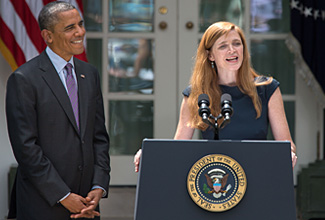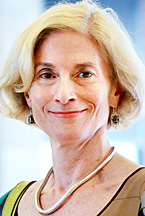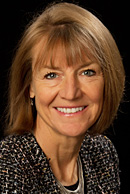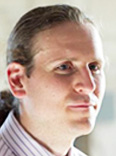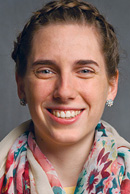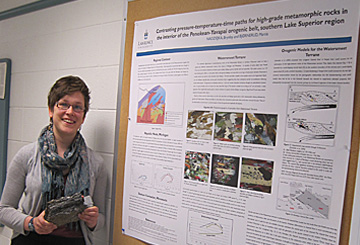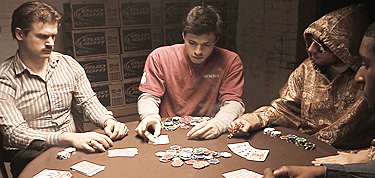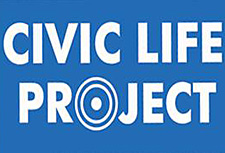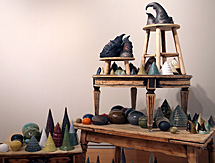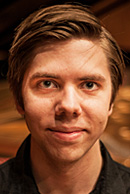Retiring President Jill Beck presided over her final Lawrence University commencement Sunday, overseeing the awarding of 307 bachelor’s degrees to 289 graduates and four faculty awards.
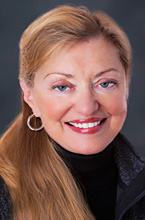
Before the pomp and circumstance had finished, she had a new title — President Emerita — courtesy of the Lawrence Board of Trustees.
Board chairman Terry Franke presented Beck with a citation confirming her new title and extending the Board of Trustees “sincere gratitude” to Beck for her “devoted and generous service to Lawrence.”
In his presentation, Franke praised Beck as a strong advocate for individualized learning, for her efforts to enroll an ethnically and culturally diverse student body, for cultivating environmental sustainability on campus and for her leadership on the More Light! campaign, the most ambitious — and successful — fundraising effort in Lawrence history, generating $160 million in gifts and pledges.
Senior Jonathan Vanko, a representative of all the seniors, officially welcomed Beck as a member of the class of 2013.
Four faculty members also were recognized at commencement for teaching excellence, scholarship and creative activity.
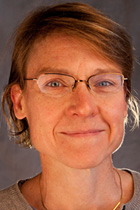
Marcia Bjornerud, professor of geology and Walter Shober Professor of Environmental Studies, received Lawrence’s Award for Excellence in Teaching, which recognizes outstanding performance in the teaching process, including the quest to ensure students reach their full development as individuals, human beings and future leaders of society.
A member of the faculty since 1995, Bjornerud previously was recognized with Lawrence’s Excellence in Scholarship or Creative Activity Award in 2007. The Association of Women Geoscientists honored her in 2011 with its Outstanding Educator Award at the national meeting of the Geological Society of America.
The recipient of two Fulbright Scholar Fellowships, Bjornerud was instrumental in the creation of Lawrence’s environmental studies program in 2000 and served as its director for six years. She is the author of two books, the science textbook “The Blue Planet” and 2005’s “Reading the Rocks: The Autobiography of the Earth,” in which she chronicles the planet’s changes and examines the toll human activity is exacting on Earth. She was elected a Fellow of the Geological Society of America in 2003
In presenting the award, Beck praised Bjornerud for weaving “the human connection into your teaching, helping students to see how earth science has meaning for their lives.”
“You make science memorable and meaningful to students immersed in your contagious excitement for your subject,” said Beck.
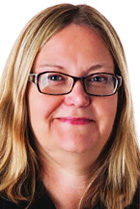
Claudena Skran, professor of government and Edwin and Ruth West Professor in Economics and Social Science, received the Award for Excellence in Scholarship, which honors a faculty member who has demonstrated sustained scholarly excellence for a number of years and whose work exemplifies the ideals of the teacher-scholar.
A specialist in international relations who joined the government department in 1990, Skran’s scholarship includes refugee issues, post-conflict development and non-government organizations. She is the author of the book “Refugees in Interwar Europe: The Emergence of a Regime” and her current research interests focus on the special problems women face in Sierra Leone. She spent six months there as a Fulbright Scholar in 2005-06 investigating the role of NGOs in refugee resettlement following the country’s 10-year-long civil war
Since her Fulbright, Skran has made numerous return trips to Sierra Leone, frequently with students. To date, more than 40 students have been to Sierra Leone, working with Skran as research assistants as well as on their own individual projects. Her work inspired her to found “KidsGive,” a scholarship program that provides tuition and other support for nearly 500 children in three schools in Sierra Leone.
“The strong humanitarian character of your scholarship is reflected in your work with Lawrence students in Sierra Leone and your sponsorship of community engaged service in the Appleton area, including work with the KidsGive scholarship program,” said Provost David Burrows in presenting Skran her award. “Your scholarship is a powerful demonstration that liberal education can lead to ethical and effective participation in contemporary world issues.”
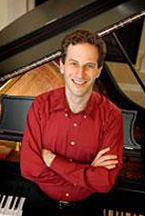
Pianist Michael Mizrahi, assistant professor of music, received the Award for Excellence in Creative Activity. Established in 2006, the award recognizes outstanding creative work for advancing Lawrence’s mission.
Mizrahi joined the conservatory of music faculty in 2009. His debut album, “The Bright Motion” on New Amsterdam Records, was released last spring. It was included on both Time Out New York’s and Time Out Chicago’s annual list of best albums of 2012.
The 10-track disc is a collection of new works for solo piano by today’s most innovative composers: William Brittelle, Ryan Brown, Patrick Burke, Mark Dancigers, Judd Greenstein and John Mayrose. The video of the album’s title track was featured on National Public Radio’s “Deceptive Cadence,” which hailed it as “a meditation on quietude amidst unceasing movement, a thick-walled cell of solitary contentment in the churn of daily life.”
Mizrahi’s recording portfolio also includes the world premiere of three works for violin and piano by Aaron Copland. He is a founding member of both NOW Ensemble, a chamber group devoted to commissioning and performing new music by emerging composers, and Moët Trio, a piano trio that recently completed a two-year residency at the New England Conservatory.
“Not only do you play with commanding expertise, you provide a rich context for understanding the pieces you perform by offering verbal explanations of the historical setting for these works and the techniques used to compose them,” said Beck in recognizing Mizrahi. “Your performance ability, innovative spirit and devotion to the beauty of both traditional and contemporary music combine to make you an exceptional artist. You have brought joy and insight to us at Lawrence and to the world beyond.”
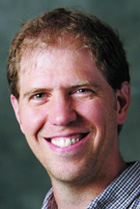
Peter Thomas, assistant professor of Russian Studies, received the Young Teacher Award in recognition of demonstrated excellence in the classroom and the promise of continued growth.
He joined Lawrence’s Russian department in 2006 after teaching at St. Olaf College. Beyond teaching Russian, Thomas also leads classes in 20th-century Russian literature, especially the works of Valdimir Nabokov. Additionally, his scholarly interests include Russian poetry, translation and contemporary composers.
In presenting the award, Burrows hailed Thomas for his “deep mastery of the material that brings new insights to complex texts and enables students to see new connections and construct new ideas.”
“Your insistence on high standards brings out the best in students, pushing them to new levels of accomplishment,” said Burrows. “Every course you teach has been a complete success and has had a transforming effect on your students.”
About Lawrence University
Founded in 1847, Lawrence University uniquely integrates a college of liberal arts and sciences with a nationally recognized conservatory of music, both devoted exclusively to undergraduate education. It was selected for inclusion in the Fiske Guide to Colleges 2013 and the book “Colleges That Change Lives: 40 Schools That Will Change the Way You Think About College.” Individualized learning, the development of multiple interests and community engagement are central to the Lawrence experience. Lawrence draws its 1,500 students from nearly every state and more than 50 countries. Follow Lawrence on Facebook.
